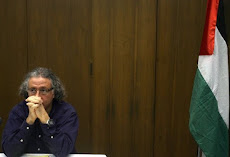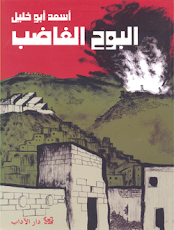So this Syrian opposition "journalist" (he won awards in the West--has any Syrian opposition journalist not won awards in the West--look up his name on Wikipedia) dude wrote a most stupid and anti-Semitic article in Haaretz in which he addressed Israelis saying that both Israelis and Syrians suffered Holocausts. Right after the article appeared on the site of Haaretz, I am told his account on Twitter was removed and then the article was removed from Haaretz. Here it is:OpinionThe Holocausts That Connect Syrians and Israelis
The threat of 'Israel' and 'the Jews' have anchored Assad's regime, but Syrians are starting to question it. That offers an opening for Israel to act against the massacre of civilians by the regime and its allies, Iran and Hezbollah | Opinion
Mansour Omari
19.12.2016 | 15:55
The centrality of the narrative of unending conflict between Syria and Israel has been the backbone of the Assad regime for decades – and still is. But Syrians themselves are having second thoughts.
Many dictatorships exploit and overstate foreign threats as tools to suppress and frighten their own people, and as a common national cause that legitimizes restricting domestic freedoms and the lack of state budgets to deal with poverty, in exchange for government 'protection' from that external threat.
The threat of Israel and the role of Syria as standard-bearer for the Palestinian national movement plays that role in Syria.
The Syrian military generally commandeers an estimated 70 percent of the Syrian state budget, while much of its people – even more so during the current intensified civil war – live in poverty. The justification has always been that Syria needs its army to be strong and well-resourced to be in constant readiness for the liberation of Palestine.
Assad’s incitement: Syria's prime enemy is 'Israel' – or 'the Jews'
This rhetoric filters down to every detail of Syrians' lives, from first grade schoolbooks to university studies. All these texts declare that the primary enemy of Syrians is Israel; at various points "Israel" is conflated with the term "Jews". An educational system committed to hatred and fantastical images of the enemy serve to exaggerate the tension and fear in Syrian society.
The Syrian domestic intelligence services' most common charge against Syrian civilians for the last five decades is that they're accused of being "a spy for Israel." It functions as a catch-all charge for anyone who doesn't cooperate sufficiently: from Assad's political opponents to a shopkeeper who refuses to sell goods at a reduced price to the son of a high-ranked army officer.
The spread of this false accusation has proven its usefulness to the regime, not least by stifling freedom of expression and other basic freedoms. In March 2011, Syrian intelligence's first conspiracy theory explaining popular demonstrations against Assad was that Israel was paying people in Syria to take to the streets against "the First Protector of Palestinian rights." The one state that defends the Palestinians. The Syrian state media kept this rhetoric going until very recently, embellishing it with further conspiracy theories accusing Israel of supporting ISIS and the Nusra Front in order to destroy Assad’s regime and thus the Palestinian national cause.
Challenging the regime – and its 'enemy' narrative
However, the regime's rhetorical front against Israel and its exploitation to shore up the regime's iron fist started fracturing in the eyes of many Syrians as the protests and Assad's harsh reprisals became more widespread, and this shift has been accelerated by news reports that spread through social media.
Israeli statements and actions on Syria have gone viral thanks to the cognitive dissonance of anti-regime Syrians seeing that the "enemy state" has challenged the Syrian regime.
This happened when it was reported that Israeli medical teams at the border fence with Syria received injured Syrians for treatment, while Jordan did not.
A more recent example was the strong verbal attack of Nizar Amir, an Israeli diplomat at the UN, on the human rights crimes of the Syrian regime, while at the same General Assembly meeting, the Egyptian ambassador to the UN voted in favor of a Russian-led draft resolution that allowed the continuation of airstrikes on Aleppo.
Syrians were struck by these remarks and actions that challenged the most basic premise of Assad's anti-Israel indoctrination.
How could the regime claim to be the protector of Palestinian rights while it slaughters its own people? How could it claim to be defending Palestinian prisoners' rights, while the detainees in the Syrian detention centers are held in inhuman conditions, mostly underground, tortured, starved and killed, tens of thousands having died in detention centers? While prisoners in Israel have TVs and can study toward academic degrees? How Israeli prisons are open to inspection by human rights organizations, while the Syrian regime refuses to even admit it has a torture archipelago underground? How is it possible that Assad's allies Hezbollah and Iran claim they want to "throw the Israelis into the sea," when they themselves are occupying Syria and slaughtering Syrian women and children?
Breaking the 'Israel taboo' requires Israeli action
This awakening could have longer-term implications. It could be a first step towards breaking the Assad regime taboo against even uttering the word "Israel" among many Syrians. It could have a mitigating effect on popular antagonism toward Israel, as the degree to which it has been engineered by Assad becomes clearer. It could even being closer a historical opportunity for social and cultural peacemaking between Israelis and anti-regime Syrians, who are both now in the cross-hairs of the Assad regime, Hezbollah, and other Iranian-led sectarian militias.
But this limited awaking cannot last long if it is not supported by the initiation of action or popular support on the Israeli side. Israelis now have a unique chance to step up and help stop the massacres that Assad is committing against innocent civilians. Israel could change history by doing this.
At a meeting with Palestinian Muslim clerics, Israeli Chief Rabbi Yitzhak Yosef said that Syrians "are suffering a small holocaust… as Jews it is forbidden for us to remain silent. The call will come out from here: Genocide cannot be ignored, not in Syria and not anywhere, and not against any people."
Such a statement declares that people in Syria and Israel share both core values as well as geopolitical destiny. The tragedy of Aleppo is a critical turning point in the Syrian conflict for Syrians to judge how the international community expresses its humanity. There is no more appropriate time in the history of the Syrian-Israeli conflict than now to change how our children, on both sides, will remember how each side behaved during this time, and what ideals they will be raised by.
Mansour Omari is a Syrian journalist and human rights activist."








